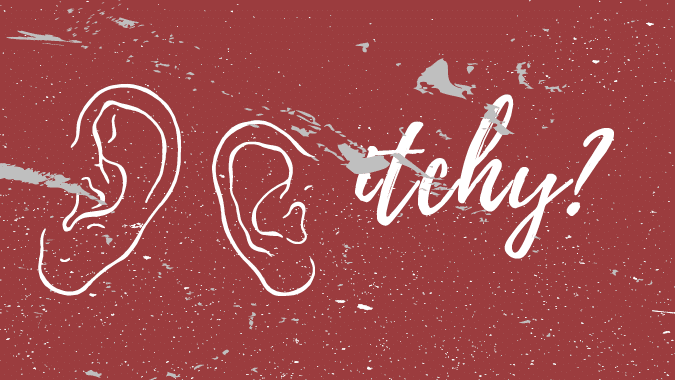
Next to pain, itching is probably the most uncomfortable physical sensation we experience. It is annoying, distracting, and in some cases, absolutely maddening. When that itching occurs in a place we can’t reach, it can be difficult to find relief. Our ear canals are the most common place unreachable itching occurs, but most of us don’t give it much thought. Fortunately, most causes of deep ear itching are understood, and there are things we can do to alleviate or even prevent it.
WHAT CAUSES ITCHING SENSATIONS IN THE EAR?
DRY SKIN
In the outer ear, itching is rarely a notable issue, since we can easily rub or scratch that itch away. It is usually caused by dry skin or irritants that come into contact with the skin. It is no different than itching on any other exposed part of the body, but if it becomes a habitual nuisance, applying a bit of mineral oil or Vaseline to the affected area with a cotton swab can help rehydrate the skin and protect it from further irritation.
SKIN CONDITIONS
In addition to the superficial irritation of substances you come into contact with, two of the most common benign skin diseases, eczema and psoriasis, can also affect your ears. If scaling of the skin is present, one of these conditions will be suspected as the cause of your itching. Your hearing care provider and dermatologist can provide solutions.
ALLERGIES
In the inner parts of the ear, causes of itching become a little more complex. One of the most common culprits is allergies. The same histamine response that causes itchy hives on the skin, watery eyes, and sneezing can also cause the eustachian tube (the pathway that connects the ear to the throat) to become inflamed. Most of us will press on our tragus (that small flap of cartilaginous skin near the ear’s opening) and wiggle it vigorously to relieve this sensation, but the best home remedy is to take an antihistamine.
INFECTION
Almost everyone has suffered an ear infection at some point in our lives, and when we think back on this experience, it is usually the pain that we remember the most, but itching can also be an important indicator of bacterial buildup in the middle ear. If the itching you feel is persistent and intense, or is accompanied by a throbbing sensation or feeling of fullness, schedule an appointment with your audiologist or ENT to find out if infection is present. Treating it at this stage can save you from further discomfort down the road.
ANXIETY
You may be surprised to learn this, but simply being nervous, stressed, or feeling “on edge” can cause the ears to itch!
WHAT CAN I DO TO RELIEVE ITCHING?
As mentioned above, medication is usually the best method to relieve persistent itching deep in the ear, but there are also some over-the-counter remedies you can try. Commercial ear drops that dissolve wax can clear the ear of buildup and debris and relieve itching. Taking a hot shower or sipping a hot cup of tea may also help, as the heat dilates blood vessels and improves circulation to the ears. An added benefit of this approach is that it is likely to relax you, which will reduce nervous itching. Another useful remedy is placing a few drops of 70% rubbing alcohol in the ear. If this causes a burning sensation, that’s another sign of fungal or bacterial infection, which means a visit to your hearing care provider is in order. Even if an infection is not present, your provider may prescribe steroid drops to bring you relief.
CAN I PREVENT ITCHY EARS?
The best way to prevent itching in any part of the ear is to practice good ear hygiene. While we are all tempted to clean our ears at home, this often does more harm than good. No foreign object should ever be inserted into the ear (this means cotton swabs, too!), because this pushes wax deeper into the canal, which can cause everything from painful blockages to that persistent itching we’re trying to avoid. Wax is actually a very important component of ear health; it keeps the inner ear waterproof and resistant to microbes. Gently washing the outer ear with a soft washcloth and warm water will rinse away any excess wax or debris and help keep dermatitis at bay.
If you wear earrings, make sure they are made of a hypoallergenic metal such as pure gold, sterling silver, or titanium, as some other metals (chiefly nickel) can react with the skin and cause itching. Avoid getting excess water in your ears whenever possible. Swim with your head above the surface and consider wearing a shower cap while bathing. Additionally, switching to a shampoo formulated for sensitive skin can cut down on ear irritation.
When inserting hearing aids or earbuds, or any other device that fits into the ear, do so gently and carefully. It may seem like a small gesture, but anytime we place anything in or near the ear canal, we are potentially disrupting the ear’s natural defenses against invaders.